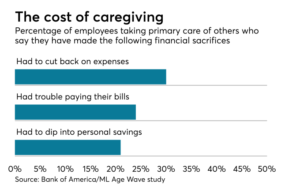On January 9, 2018 Congress passed HR3759 / S1028 the Recognize, Assist, Support and Engage Family Caregivers Act (RAISE). The RAISE Act aims to help the relatives and partners who provide medical, household and financial assistance to loved ones. The bill is on the President’s desk awaiting signature. It could affect employers of more than 40 million Americans.
Most family caregivers juggle work and caregiving. And 78% of them incur out-of-pocket costs due to caregiving, spending $6,954 a year, on average, according to AARP’s Family Caregiving and Out-of-Pocket Costs: 2016 Report.
Under the RAISE Act, HHS will create a national family caregiver strategy by bringing together federal agencies and representatives from the private and public sectors (like family caregivers, health care providers, employers and state and local officials) in public advisory council meetings designed to make recommendations. The agency will have 18 months to develop its initial strategy and then must provide annual updates.
The goals of the strategy include identifying actions that government, communities, health providers, employers and others can take to support family caregivers, including:
- Promoting greater adoption of person-centered care and family-centered care in health settings and long-term care settings
- Training for family caregivers
- Respite options for family caregivers
- Ways to increase financial security for family caregivers
- Workplace policies to help family caregivers keep working
- Collecting and sharing of information about innovative family caregiving models
- Assessing federal programs around family caregiving
- Addressing disparities and meeting the needs of the diverse caregiving population
Business and life intersect often for employees. I know, I was one who made a decision to interrupt my career to assist with caregiving of parents. There are costs to these decisions. The emotional and financial costs can catch us off guard. The chart below highlights the costs of caregiving.

In 2017, 77% of employers offered an employee assistance program (EAP) and 57% of employers offered flex time / flexible scheduling per a 2017 SHRM’s benefits report.
Approximately 1:5 employers offer family leave above state or federal FMLA levels in 2017; 1:10 employers offered elder care above start or federal FMLA levels in 2017, per SHRM.
Interesting fact – many employees polled by research nonprofit Transamerica Institute are not familiar with how FMLA leave works, nor are they aware it is offered. Caregivers often do not “self-select” to advise their employers of their caregiving duties. As the population ages, this issue is a growing concern for the caregivers and for employers who face a changing workforce.
To read the full text of the bill sponsored by Senator Susan Collins, here is the link: RAISE Act
We proactively help you assess your situation in business and home and explore ways for you to protect what is important to you by asking questions. What is your risk? Your plan? Are you ready to be ready? We’re here when you are.
Contact us to learn more about how we work with individuals, business owners and employees via Email or online @ The Living Planner #ExpectTheUnexpected #CareForPeopleCareForBusiness
